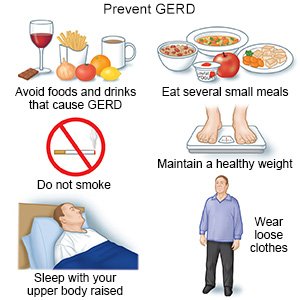Barrett Esophagus
Medically reviewed by Drugs.com. Last updated on Aug 4, 2025.
Barrett esophagus is a condition that causes cells in your esophagus to change into cells similar to intestine cells. The changed cells may become pre-esophageal cancer cells. This means they are not currently cancer but may become cancer. Dysplasia is a term used to describe the condition of having pre-cancer cells.
 |
DISCHARGE INSTRUCTIONS:
Call your local emergency number (911 in the US) if:
- You have severe chest pain and shortness of breath.
Return to the emergency department if:
- Your bowel movements are black, bloody, or tarry.
- Your vomit looks like coffee grounds or has blood in it.
Call your doctor or gastroenterologist if:
- Your symptoms do not improve with treatment.
- You have questions or concerns about your condition or care.
Medicines:
- Anti-reflux medicines may be needed to help decrease the stomach acid that can irritate your esophagus and stomach. These medicines may include proton pump inhibitors (PPI) and histamine type-2 receptor (H2) blockers. You may also be given medicines to stop vomiting.
- Take your medicine as directed. Contact your healthcare provider if you think your medicine is not helping or if you have side effects. Tell your provider if you are allergic to any medicine. Keep a list of the medicines, vitamins, and herbs you take. Include the amounts, and when and why you take them. Bring the list or the pill bottles to follow-up visits. Carry your medicine list with you in case of an emergency.
Manage Barrett esophagus:
- Do not eat foods that make your symptoms worse. Examples are chocolate, garlic, onions, spicy or fatty foods, citrus fruits (oranges), and tomato-based foods (spaghetti sauce). Do not have alcohol, caffeine, or carbonated drinks, such as soft drinks. Ask your provider if you should not have other foods or drinks.
- Maintain a healthy weight. Ask your provider what a healthy weight is for you. Your provider can help you create a weight loss plan, if needed.
- Do not smoke. Nicotine and other chemicals in cigarettes and cigars may worsen acid reflux. Ask your provider for information if you currently smoke and need help to quit. E-cigarettes and smokeless tobacco still contain nicotine. Talk to your provider before you use these products.
 |
Treatment options
The following list of medications are related to or used in the treatment of this condition.
For support and more information:
- American Cancer Society
250 Williams Street
Atlanta , GA 30303
Phone: 1- 800 - 227-2345
Web Address: http://www.cancer.org
Follow up with your doctor or gastroenterologist as directed:
Endoscopy and biopsy are done regularly to help look for early signs of esophageal cancer. If you have no dysplasia, your providers may do these tests in 1 year. You may then need the tests every 3 to 5 years, depending on your risk for cancer. If you do have dysplasia, you may need the tests several times each year. Timing depends on the dysplasia grade and treatment used. Write down your questions so you remember to ask them during your visits.
© Copyright Merative 2025 Information is for End User's use only and may not be sold, redistributed or otherwise used for commercial purposes.
The above information is an educational aid only. It is not intended as medical advice for individual conditions or treatments. Talk to your doctor, nurse or pharmacist before following any medical regimen to see if it is safe and effective for you.
Learn more about Barrett Esophagus
Treatment options
Care guides
Symptoms and treatments
Medicine.com guides (external)
Further information
Always consult your healthcare provider to ensure the information displayed on this page applies to your personal circumstances.
